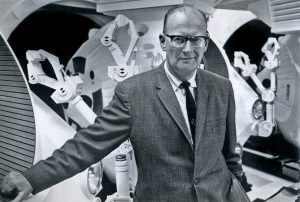
May 26, 2017, by The Ingenuity Lab
Paul Kirkham: Stifling ideas is self-defeating
This week’s blog is written by Paul Kirkham, researcher in the field of Entrepreneurial Creativity at The Haydn Green Institute for Innovation and Entrepreneurship, Nottingham University Business School.
Writing to his rival and fellow polymath Robert Hooke in 1676, Isaac Newton remarked:
“If I have seen further than others, it is by standing upon the shoulders of giants”
What he meant was that his own achievements were made possible by those of his predecessors.
Three hundred years later the same point was illustrated by this paradox, attributed to another great scientist, Arthur C Clarke:
Imagine you’re on a spaceship travelling towards some distant star. One day you glance in the equivalent of your rear-view mirror and espy a faster vessel about to overtake you.
It turns out that this vessel is from your own planet. It left Earth years after your mission but has caught up as a result of major advances in technology. It surges towards you and is going to leave you in its celestial wake.
So where was the merit in you setting out at all? Why did you bother? What was the point? The answer is that the second spaceship would never have been conceived were it not for the efforts of those who created the first, and if they have any sense of decency they will stop and pick you up.

British science fiction author Arthur C. Clarke
What was true in Newton’s day and Clarke’s day remains true now: the mind is the greatest resource humanity possesses. It solves the problems of the present and lays the foundations for the future. It’s readily available, inexhaustible and free at the point of use, and it deals in the invaluable currency of ideas. And it’s ideas that enable us to progress.
Overlooking the obvious
Now, all this might sound like the stuff of Sybil Fawlty’s proposed Mastermind appearance (subject: the bleedin’ obvious). Yet it’s amazing how frequently – and, indeed, how deliberately – the importance of ideas is overlooked at an institutional level.
Often the inherent structure of a hierarchy is sufficient to ensure that the wider production of ideas is curbed. We can see this in any organisation whose tacit credo might be summed up as follows: “Don’t waste your time thinking! Department A is paid to think!” Let’s pause to reflect on the consequences of such constraints.
Firstly, let’s assume that everyone is capable of having ideas – even if they might not be perfect or even particularly good. This being the case, it follows that every member of staff, from CEO to junior recruit, has something to contribute.
Now say an organisation has a thousand employees but essentially allows only 50 of them to play a part in its innovation process. So 950 people who are eminently capable of having ideas weigh in with nothing whatsoever. Ninety-five per cent of the staff find themselves shut out. This is crazy – not to mention wholly self-defeating from an organisational point of view.
Even bad ideas can be helpful
Of course, as previously conceded, not all ideas are good. Some are thoroughly daft. But even the silly ones can prove worthwhile, if only by helping to shape a vastly superior alternative.
This is because most people don’t just miraculously come out with a bona fide “great idea”. That’s not how creativity works. Instead they might have a bit of a good idea, which, combined with part of another bit of a good idea and an improvement to someone else’s bad idea and a reaction to yet another’s idiotic idea, forms the beginnings of a feasible idea.
It’s only after this potential idea has been honed and examined that we can start to say it might be a “great idea”. So first we need to learn to have lots of ideas; and then we need to learn to be willing to throw away most of them and see the rest change – sometimes significantly.
Accepting that most of our ideas won’t make the cut means not prizing them too highly. We have to acknowledge that there’s always room for improvement and that the true waste doesn’t lie in exploring novel concepts that might just lead nowhere: it lies in deterring novel concepts in the first place.
It’s not rocket science – and it’s not magic either
A leading thinker of recent vintage, Paul Lutus, who designed equipment for NASA missions before writing some of the most important programs in the history of personal computing, has argued that there are “idea producers” and “idea consumers”. He once said of the latter: “The central organising principle of this class is that ideas come from somewhere else – from magical persons, geniuses, ‘them’.”
A key lesson for the management of any organisation is that the more it encourages “idea producers” – and, by extension, the less it unwittingly cultivates “idea consumers” – the more likely it is to achieve success through innovation.
Ultimately, every organisation has the choice of nurturing ideas or stifling them. We can stand on the shoulders of giants or spend our time anxiously glancing back over our own. Why would anyone choose the latter? As Newton lamented: “I can calculate the motion of heavenly bodies – but not the madness of people.”
This article was originally published on Changeboard (20 April 2016).
Please do ensure you subscribe to this blog to keep updated about our events and activities! You can also follow us on Facebook, Twitter, LinkedIn and Instagram.
No comments yet, fill out a comment to be the first


Leave a Reply